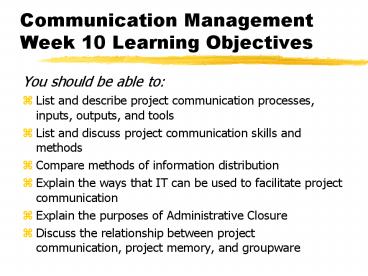Communication Management Week 10 Learning Objectives - PowerPoint PPT Presentation
Title:
Communication Management Week 10 Learning Objectives
Description:
Integrate e-mail, document database, Intranet interface. Communication ... Collaboration (Document sharing) 3 Types of GW/PM Tools. TIME. PLACE. Same. Different ... – PowerPoint PPT presentation
Number of Views:35
Avg rating:3.0/5.0
Title: Communication Management Week 10 Learning Objectives
1
Communication Management Week 10 Learning
Objectives
- You should be able to
- List and describe project communication
processes, inputs, outputs, and tools - List and discuss project communication skills and
methods - Compare methods of information distribution
- Explain the ways that IT can be used to
facilitate project communication - Explain the purposes of Administrative Closure
- Discuss the relationship between project
communication, project memory, and groupware
2
Project Communication
- Generation
- Collection
- Dissemination
- Storage
- Disposition
- Of Project Information
Getting the right information to the right people
at the right time in the right format
3
Communication Processes
- Planning
- determining info. needs of stakeholders
- who, what, when, how
- Information Distribution
- getting needed info. to stakeholders
- Performance Reporting
- collecting, disseminating status reports
- Administrative Closure
- formalize project completion
4
Communication Planning Processes Inputs
- Requirements of stakeholders
- varying types, formats
- use stakeholder analysis (tool) to identify
- Communication technologies
- immediacy of need for information
- availability of technology
- expected staffing
- length of project
- Constraints and assumptions
5
Communication Planning Outputs
- Communication Management Plan
- collection and storage methods
- distribution structure what, who, when, how
- description of information
- format, content, level of detail, definitions
- production schedules for info.
- information access methods and controls
- change process for updating the plan
- stakeholder analysis
6
Challenges to Communication Planning
- Assumption that existing channels adequate
- May need separate section of WBS for
communication activities - Coordination of communication across projects
- Consistent format across projects
- use standard templates
7
Information Distribution
- Inputs
- work results
- communication management plan
- project plan
- Outputs project records to stakeholders
- Tools
- communication skills
- retrieval and distribution systems
- technology
8
Communication Knowledge and Skills
- Appropriate media choice
- memo, phone, voice mail, e-mail, FTF
- Formal vs. informal stakeholder preferences
- Oral vs. written communication
- Importance of relationship-building
- Writing style
- technical writing clear, concise, audience(s)
- Presentation styles
- Personality types - awareness of differences
9
Meetings
- Status review meetings
- Short, frequent, maybe stand-up
- Highlights of written reports
- Foster accountability for results, empowerment
- team-building
- Better Meetings
- avoidance?
- agenda and purpose intended outcome
- participants and their preparation
- set ground rules, review purpose
- surface and resolve conflicts
10
Conflict Management
- Win-Lose
- Forcing
- imposed by Management
- Win-Win
- Confrontation
- Compromise
- Lose-Lose
- Smoothing
- Withdrawal
11
Performance Reporting
- Status of project
- Progress toward completion
- Forecasting future status and progress
- Scope, schedule, cost, quality, risk
- Inputs
- project plan, work results
- Outputs
- performance reports, change requests
12
Performance Reporting Tools
- Performance reviews
- Variance analysis
- Trend analysis
- Earned value analysis
- most commonly used
- integrates scope, cost, and schedule
- Information distribution tools, methods, systems
13
Administrative Closure
- Inputs
- documentation of performance measurement
- documentation of project products
- Outputs
- project archives
- formal acceptance
- lessons learned
- reflective statements
- causes of variance
- why corrective actions taken
14
Administrative Closure
- Verify and document project results
- Formalize client acceptance of outcomes
- Collection of project records
- Analysis of success and effectiveness
- Archiving information for future use
- project memory
- gt organizational learning
- Tools performance reporting system
15
Project Memory
- Stored, integrated project records
- Facilitates retrieval and reuse
- Project data
- Documents (reports, e-mails, spreadsheets)
- Events (meetings, decisions, milestones)
- Contexts
- Rationales for decisions
- Processes
- Subset of organizational memory
16
Role of technologyGroupware
- Computer-augmented teamwork
- IT that supports groups and teamwork
- User is business team, not individual
- Supports team (project) processes
- Need support for distributed teams
- Built on existing network infrastructures
- Storage and retrieval of project memory
- Integrate e-mail, document database, Intranet
interface
17
3 Types of GW/PM Tools
Collaboration (Document sharing)
Communication (Meetings,e-mail, etc.)
Coordination (Scheduling, resources)
18
TIME
Different
Same
GDSS
Team Room Project Office
Same
EMS
PLACE
Anytime/ Any place
WWW Lotus Notes
Conference calls Videoteleconf.
Different
WWW































